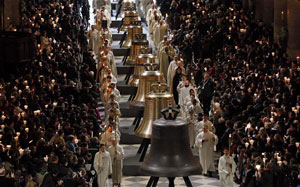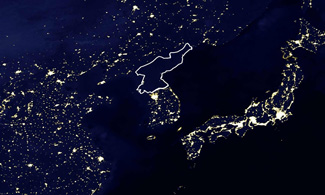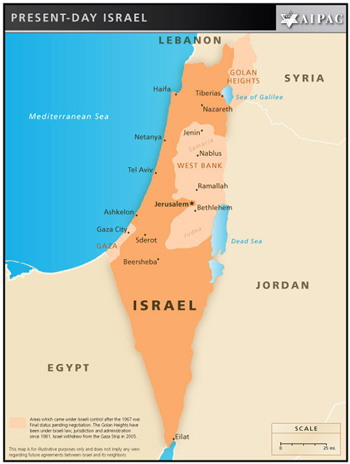redo Jump to...
print Print...
FRANCE – Notre Dame bells newly cast to celebrate cathedral’s 850th anniversary
 Nine newly cast bells have gone on display at Notre Dame, the Paris cathedral, weeks before they are hoisted into the two great towers in time for Easter.
Nine newly cast bells have gone on display at Notre Dame, the Paris cathedral, weeks before they are hoisted into the two great towers in time for Easter.
The new bells, weighing 23 tons in total and named after saints and prominent Catholics, have been cast to mark the 850th anniversary of the Cathedral’s founding in 1163. They replace bells which had become discordant, and will first be heard as they peal out on March 23, in time for Palm Sunday and Easter week.
Eight of the nine new bells were cast in a foundry in the Normandy town of Villedieu-les-Poeles. The ninth – a “bourdon,” or Great Bell, named Marie – was cast in the Netherlands and then sent to Normandy to join the others.
On Thursday [Jan. 31] they were sent by a slow-moving convoy of flatbed trucks to the French capital.
The old bells, which dated from different periods throughout Notre Dame’s history, were out of tune with each other and with the one surviving Great Bell, called Emmanuel, which has hung in the cathedral since the 17th century. It will remain.
“The idea of this project was to recreate the old bells of Notre Dame in terms of power, in terms of tune, which means that there will be again 10 bells ringing into the cathedral as it used to be in the Middle Ages and up until the French Revolution,” said Paul Bergamo, president of the Cornille-Havard Foundry in Villedieu-les-Poeles.
FRANCE – “Light pollution” law to force shops and offices to go dark overnight

North Korea in the dark: Will France’s news law cause it to look like this? [This picture of Earth at night is based on 1994-1995 satellite data from the Defense Meteorological Satellite Program Operational Linescan System, which maps the location of permanent lights on the planet. The borders of North Korea are outlined in white, with Japan off to the right, China to the left and South Korea below.]
Under the new law, which comes into effect on July 1, all exterior and lights in shop window displays of non-residential buildings will [have to by law] be turned off at 1am. Interior lights in offices and other non-residential buildings will have to be switched off an hour after the last employee leaves. Local government will be able to make exceptions for Christmas and other special occasions, and in certain tourist or cultural areas.
The move, announced on Wednesday [Jan. 30], is expected to save 250,000 tons of CO2 – enough energy to power 750,000 French households for a year.
The French ecology minister, Delphine Batho, said she hoped the law would change attitudes in France and help the country become a pioneer in reducing [what she calls] “light pollution.”
ISRAEL – Military considers buffer zone inside Syria
 JERUSALEM – Israel may set up a buffer zone inside Syria to keep terrorists from crossing into Israel in the event that Syrian President Bashar al-Assad’s embattled regime is toppled, Britain’s The Sunday Times reported. The newspaper quoted unnamed sources as saying the buffer zone could reach up to 10 miles inside Syria, and would be modeled on the Lebanese security zone, which is jointly policed by the South Lebanese and Israeli armies.
JERUSALEM – Israel may set up a buffer zone inside Syria to keep terrorists from crossing into Israel in the event that Syrian President Bashar al-Assad’s embattled regime is toppled, Britain’s The Sunday Times reported. The newspaper quoted unnamed sources as saying the buffer zone could reach up to 10 miles inside Syria, and would be modeled on the Lebanese security zone, which is jointly policed by the South Lebanese and Israeli armies.
The defensive measures were drawn up by the Israeli military and presented to Israeli Prime Minister Benjamin Netanyahu. The proposal is aimed at securing the 47-mile border against the growing threat from inside Syria. Israel would patrol its border with the cooperation of local villagers, and the plan would include two Israeli infantry brigades and a tank battalion based at outposts in Syrian territory, according to Israeli defense sources. Also under construction is a 20-foot steel wall along the border that replaces a fence.
“The old fence was fine for more than 40 years. We knew then that there was a strongman in Damascus. But not anymore. The new wall will be good when it’s ready but without the buffer zone mortar and rocket attacks on Israel would be a daily event,” the source said.
“We’ve presented the prime minister with a comprehensive plan to defend Israel’s border after, or perhaps before, the fall of Assad’s regime,” a source told the newspaper. “A buffer zone set up with the cooperation of local villagers lies at the heart of the plan. If the country remains unstable we might have to stay there for years.”
Israeli air strikes Wednesday allegedly destroyed a weapons convoy heading for Hezbollah in Lebanon and a military research facility that foreign reports said manufactured chemical weapons and missiles.
(The news briefs above are from wire reports and staff reports posted at London’s Daily Telegraph on Feb. 2 and The Guardian on Jan. 30 and The NY Post & UPI.com combined on Feb. 2/3.)
Questions
1. For each of the 2 countries, give the following information:
a) location/the countries that share its borders
b) the religious breakdown of the population
c) the type of government
d) the chief of state (and head of government if different) [If monarch or dictator, since what date has he/she ruled? – include name of heir apparent for monarch]
e) the population
2. For FRANCE – news brief #1 (Notre Dame bells):
a) list the who, what, where and when of the news item
b) Why did officials want to replace the bells?
c) Name the character in the novel who rang the bells at Notre Dame. What was the title of the book? Who was the author?
3. For FRANCE – news brief #2 (turn out the lights law):
a) list the who, what, where and when of the news item
b) What are the unintended consequences of requiring all businesses to turn off all lights after 1 a.m.?
c) The French government says the law “is expected to save enough energy to power 750,000 French households for a year.” There is no shortage of electricity in France, and private businesses can afford to pay for the electricity they use to power their lights. Why is the French government implementing this law?
d) Do you agree with this law for France? Do you think the U.S. Congress should pass such a law? Explain your answer.
4. For ISRAEL:
a) list the who, what, where and when of the news item
b) Look at the map of Israel and the surrounding countries. Consider the numerous attacks on Israel from various terrorists. Consider what terrorists did to our ambassador and three other Americans at our consulate in Libya, after longtime dictator Gadhafi was deposed and murdered. What would you say to a person who says Israel should not go into Syria to create a buffer zone?
Background
FRANCE – ON THE BELLS OF NOTRE DAME:
The nine casts were ordered for the cathedral’s 850th birthday – to replace the discordant “ding dang” of the previous four 19th century chimes. After the originals bells – including the original Mary – were destroyed in the French Revolution, the replacements were widely said to be France’s most out-of-tune church bells.
“During the French Revolution, they (the original bells) were all brought down and broken except (one) and four other bells that were recast in the middle of the 19th century…This will complete in a definitive manner the entire set of 10 bells as conceived…in the Middle Ages,” Notre Dame rector Patrick Jacquin said.
ISRAEL:
- According to The Sunday Times’ report, the plan calls for a buffer strip stretching over 9 miles in the Golan Heights, an area Israel captured in the 1967 war. In the initial stage, two Israeli infantry brigades and a tank battalion will be deployed inside Syrian territory.
- While the plan is being deliberated, the Israeli military has accelerated work that began last year on a new hi-tech security fence being built along the border with Syria.
- Touted as “the world’s most advanced security fence,” the barrier is planned to employ sensors and detectors that will automatically beam back data to a computerized control center and alert operators to suspicious activity, including in extreme weather, The Jerusalem Post reported Sunday.
- Five out of the roughly 43 miles that comprise the almost 20 feet high steel barrier were built last year, and the project is scheduled for completion by mid-2013, the paper said.
- In early January, Netanyahu said the 70-million-U.S. dollar project aimed to replicate the success of a recently completed border fence along Israel’s western border with Egypt.
- “We know that on the other side of the border today, the Syrian army has moved away, and global Jihad forces have moved in its place,” Netanyahu told cabinet ministers, citing Syria’s growing instability. (from China’s Xinhua news agency)
The Wall Street Journal reported:
- Days after reports surfaced that the Israeli air force targeted a transport of antiaircraft missiles en route to Lebanon, Israel’s defense minister indicated that his country was responsible. Israel Defense Minister Ehud Barak said the Jan. 30 attack is “another proof that when we say something we mean it. We say that we don’t think it should be allowable to bring advanced weapons systems into Lebanon to [terrorist group] Hezbollah from Syria when Assad falls.” Mr. Barak gave no further details about the attack.
- The attack was Israel’s first major foray into the Syrian civil war and raised concerns Israel will take further military action in the country to protect itself from instability stemming from the disintegration of the regime.
- It followed repeated warnings by Israeli Prime Minister Benjamin Netanyahu and other top officials of the dangers of Syrian weapons falling into the hands of Hezbollah and other hostile forces in the region.
And London’s Daily Telegraph reported on Iran’s reaction to Israel’s strike on weapons headed for Hezbollah:
- Saeed Jalili, head of Iran’s Supreme National Security Council, said: “Just like it regretted all its wars … the Zionist entity will regret its aggression against Syria. The Syrian people and government are serious about this, and the Muslim world supports Syria. Syria is at the forefront of the Muslim world’s confrontation with the Zionist entity,” he added, in reference to Israel.
Resources
FRANCE – Visit the Notre Dame website to read more about the bells at: notredamedeparis.fr/-English-
ISRAEL – For a map, go to: mfa.gov.il/MFA/Facts+About+Israel/Israel+in+Maps/Golan+Heights.htm
Watch a Daily Telegraph video on the bells of Notre Dame:
Daily “Answers” emails are provided for Daily News Articles, Tuesday’s World Events and Friday’s News Quiz.



